Wondering whether setting up a Google Business Profile is worth your time?
Around 87% of consumers use Google to evaluate local businesses. Creating a Google Business Profile is part of giving your small business every advantage.
In this article, you’ll find out how a Google Business Profile benefits business owners, how to set one up today, and how to optimize it for SEO.
In This Article
What is a Google Business Profile?
Google Business Profile is a free tool you can use to display your business information, hours, and contact information across local search results.
It’s easy to set up: you’ll create an account and fill in your information.
Once complete, your business will have a prominent display that appears in local search results including in Google Maps searches.
Here’s an example of a Google Business Profile appearing in a search for “Brasserie Blanc Leeds.”
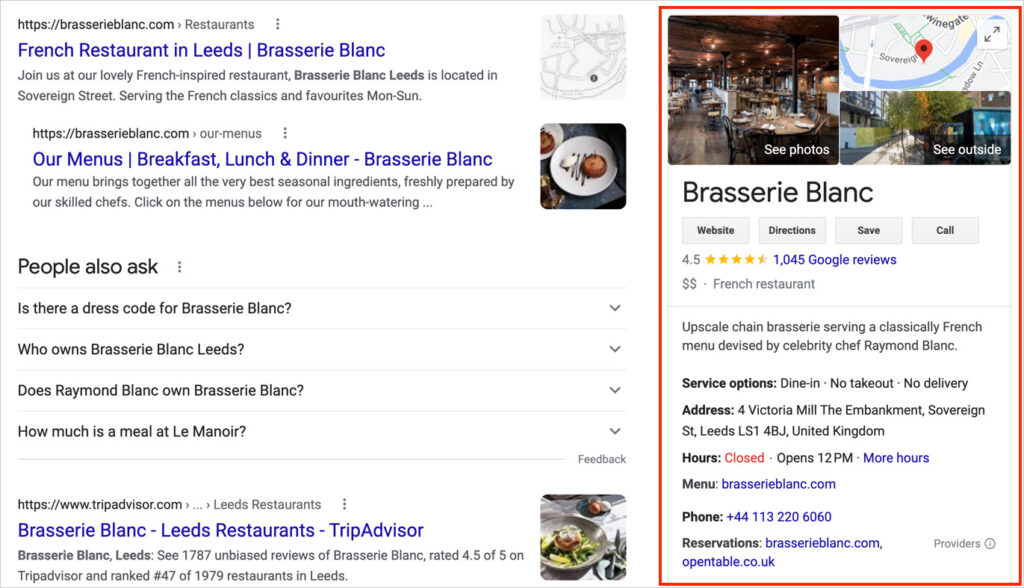
If you do the same search in Google Maps, on a desktop, the profile displays to the left of the map.
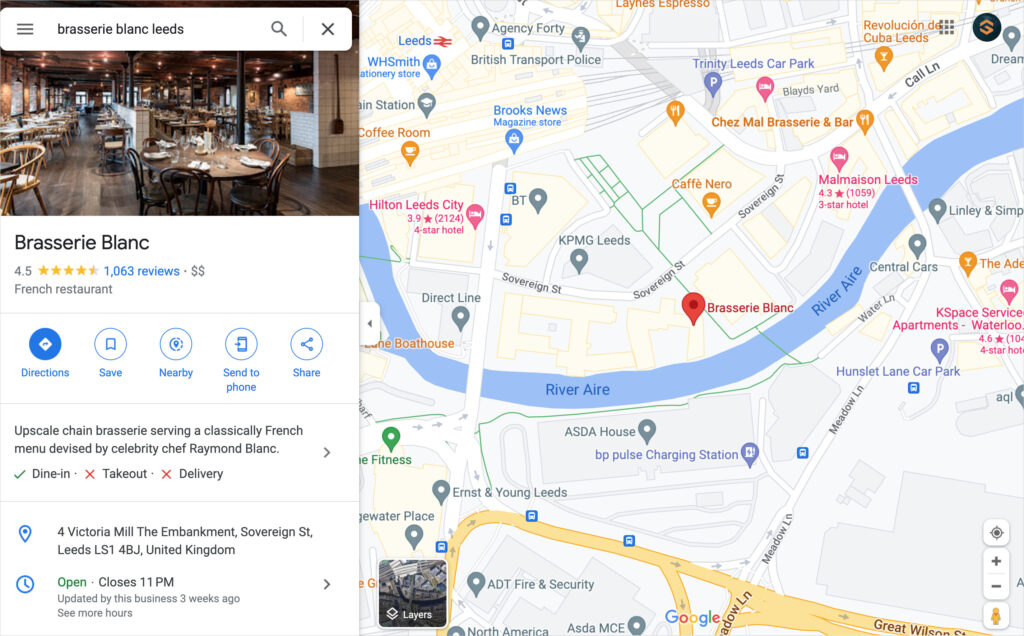
The profile provides searchers with useful information like the hours the restaurant is open, and whether they offer dining-in or strictly take-out.
Searchers can even book a table without leaving Google Maps.
Google Business Profile was formerly called Google My Business (or GMB for short).
Benefits of Google My Business Profile (GBP)
Because these profiles are prominent in search results, they offer several benefits.
- Your profile information appears in several different areas of local search, including Google Maps.
- Google Star ratings and reviews of your business will be visible in your profile.
- You can create a strong first impression with the profile.
- Used well, your profile can boost conversions too.
Additionally, Google Business Profile is perceived to be the single most important local SEO ranking factor, according to a recent survey of marketing professionals.
How to Create a Google My Business Profile
To create a Google My Business Profile go to google.com/business.
- Click the Manage Now button to get started.
- You’ll be given an option to login with an existing Gmail address or to create a new Google account or new Gmail address.
- From there, follow Google’s prompts.
The instructions are clear and easy to follow.
You’ll add location (if applicable) and contact information. It’s not mandatory to list a location. Businesses without a storefront or physical location can simply skip the location step.
You can also add photos and videos along with news, announcements, or offers.
How to Optimize Your Google Business Profile for SEO
Optimizing your profile for SEO is simple. Some of these recommended steps are one-time actions. Others are ongoing. Let’s dive in.
Business Category: Be Precise
It pays to be precise about the business categories you select: These will impact what searches your business appears in.
(You’ll select a primary category for your business. You also have the option to select secondary categories.)
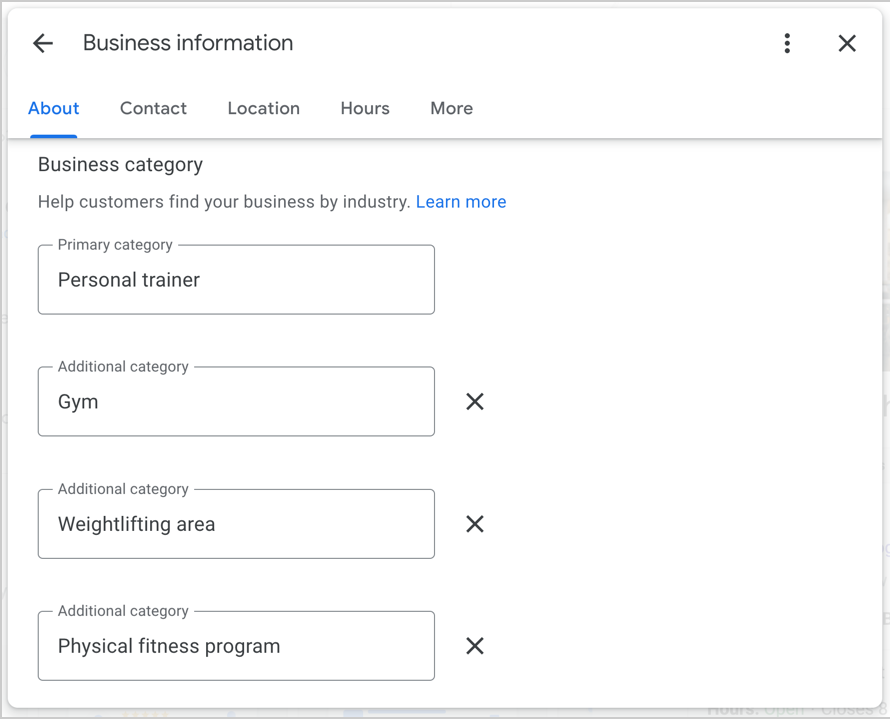
Don’t be surprised if Google updates your category. It may do so if you’ve chosen the wrong one. In this case, when you log in, you’ll see a message asking you to accept Google’s revision.
Completeness: More is Better
Take care to make your profile as complete as possible. This will include filling in all relevant information.
And take advantage of the option to post inviting photos or offers. Your Google Business Profile is a prominent part of local search, and you can control how your business appears.
Keep Business Hours Updated
Google strives to offer the most reliable, as well as relevant, information to local searchers.
For this reason it’s important to ensure that your hours are updated for holidays or are changed when necessary.
Remember: Your hours will also show up in Google Maps searches. The last thing any small business wants is someone complaining on Google that they drove to a business that was listed as open, but it was closed.
Keep Your NAP Up-to-Date and Consistent
The same holds true for “NAP” — your business Name, Address, and Phone number. When these change, immediately update your Google Business Profile.
You’ll also want to update your NAP on other sites, like your social media profiles, your website, and any listings in business directories. To update the latter, follow our simple instructions here.
Keeping your NAP consistent across the internet is important for SEO.
Take Advantage of Google Business Profile’s Special Features
There are a number of special features available in Google Business Profile that can help you attract new customers.
For example,
- Service-based businesses can include a link to book appointments.
- Ecommerce stores can list products along with prices and stock status.
- Restaurants can post their menu, provide buttons for “Order takeout” or “Order delivery.”
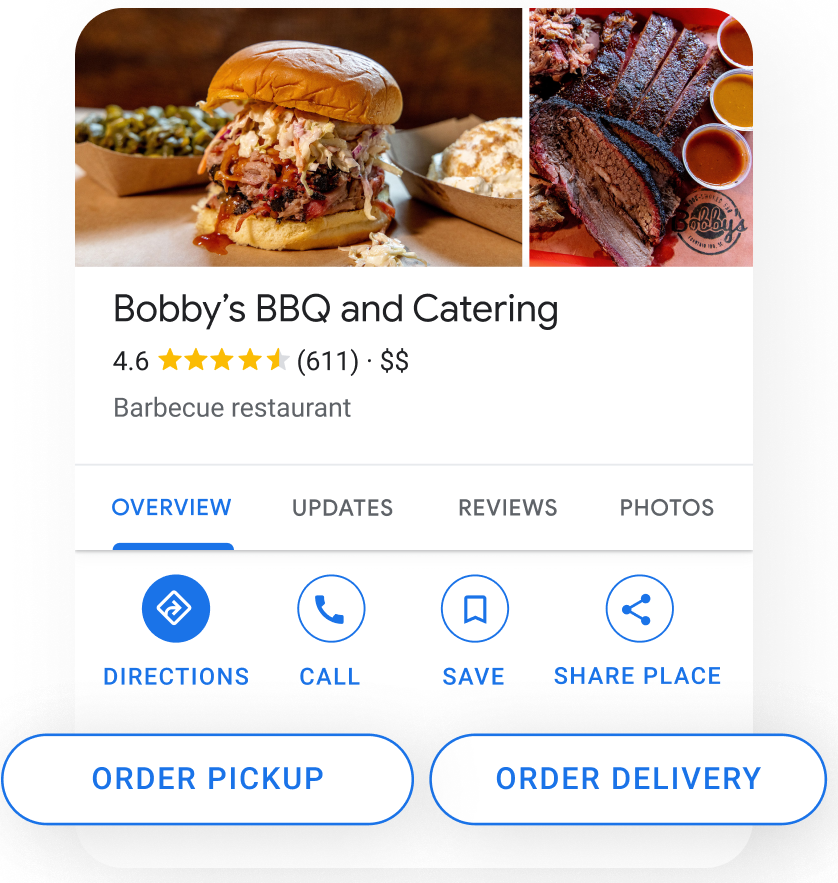
Keep Your Profile Updated
The most common mistake we see small business owners making with Google Business Profile is they set it up, then ignore it.
- Adding new content to your profile conveys to searchers, and Google, that your business is active and thriving.
- Special offers posted to your profile can attract new customers.
- Replies to Google reviews can sway customers as well.
Indeed, recency of reviews is a factor that can impact your rankings and persuade searchers to choose your business.
It’s worth taking a close look at how star ratings and reviews work, and what you need to do to optimize them for SEO.
Importance of Star Ratings and Reviews
All Google Business Profiles feature a star rating for that business. This star rating is the average of all customer ratings. The total number of customer reviews displays next to it.
These star ratings and reviews have a big impact on buyer decisions.
- 98% of searchers read online reviews of local businesses
- And Google is “the most trusted review platform,” according to BrightLocal research.
Interestingly, star ratings show up in several areas of Google Search.
They show up in the Local Pack.
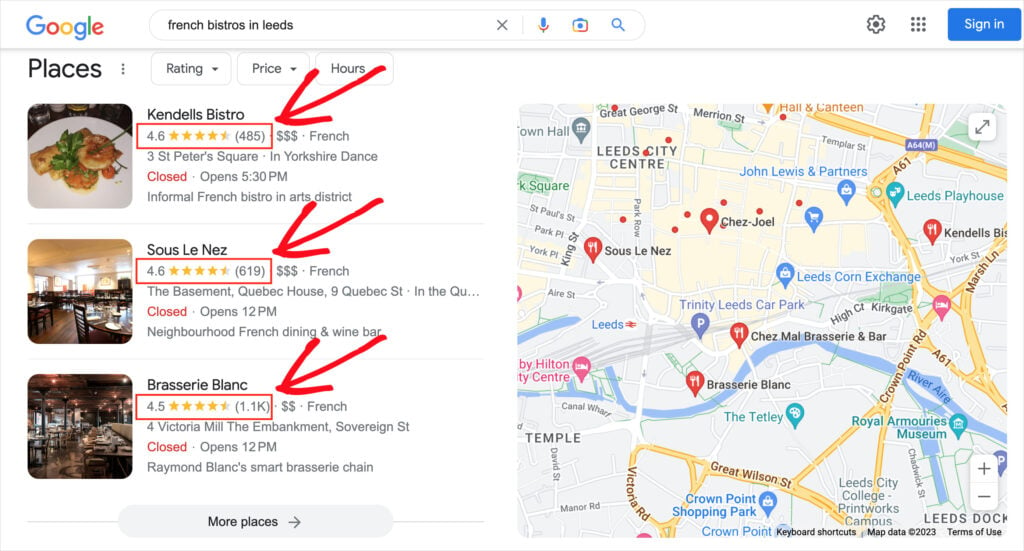
They appear in Google Maps searches when users click or mouseover a pin.
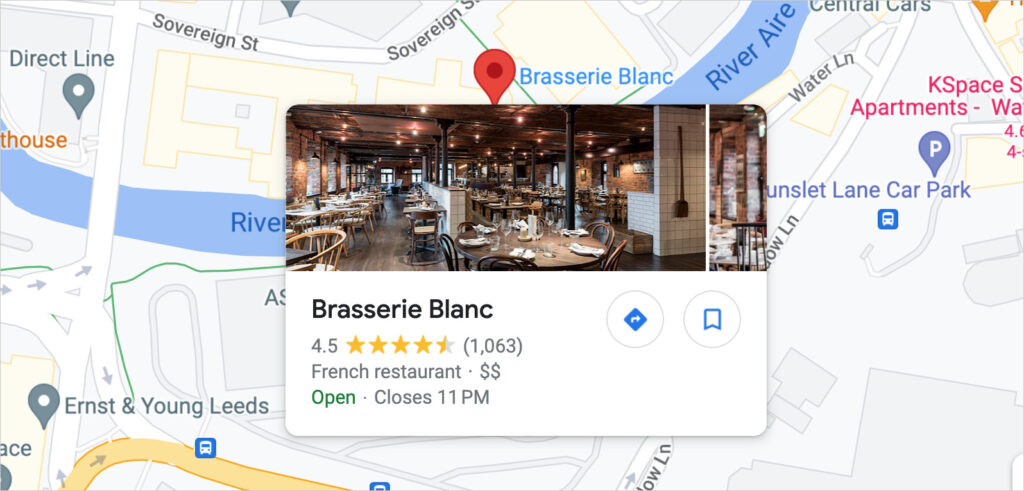
And they appear in Google Ads, including Local Services Ads.
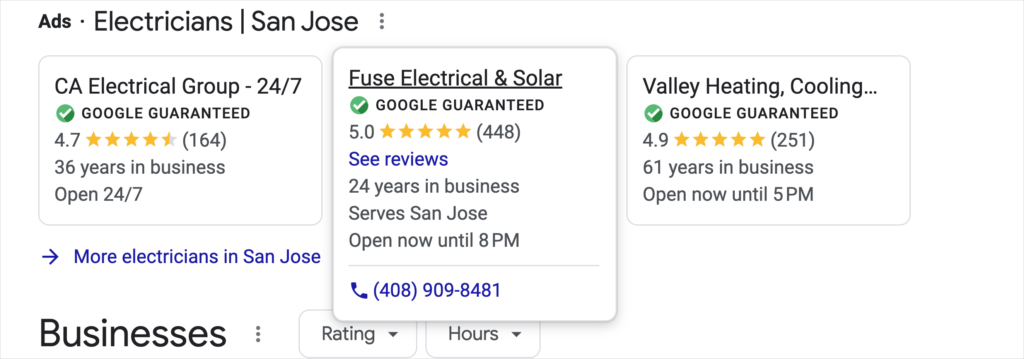
So, consumers are seeing these star ratings for your local business everywhere.
Here’s how you can make the most of this.
Continue Soliciting Reviews
After you get your first 5 or 10 reviews, don’t stop. Make it a habit to ask for reviews from every customer.
Research shows that around 73% of local shoppers are swayed by the presence of recent reviews of a business.
And a Semrush study suggests that quantity of reviews is more important than the star rating average, as long as the average is 4.1 or higher.
Aim to Increase Your Star Rating Average
While quantity may be more important quality, the Semrush study, like all research of its type, relies on averages. What works best for your business may fall outside of those averages.
Besides, a higher star rating average may help your business increase trust, traffic, and revenue.
To give yourself every advantage, set a goal to increase your star rating average.
We do this ourselves. Many businesses have found this practice to be useful.
Not surprisingly, the BrightLocal study we cited above showed that:
- 85% of searchers consider the overall average star rating of a business to be “important” of “very important.”
- When comparing businesses, 76% of searchers considered which one had the higher average star rating.
Respond Promptly
Create a routine for responding promptly to reviews. This shows that your business’s customer service is active.
And respond proactively to negative reviews. Consider creating a templated routine that staff can use when responding: that may include text and actions.
Remember: People can later change and update their reviews. More importantly, others will get a positive impression of your customer service.
Don’t be too concerned about negative reviews. Google reports that “Customers find a mix of positive and negative reviews more trustworthy.”
Next: Optimize Your Website
While Google Business Profile and customer reviews are key factors for local ranking, they’re not the only ones. How well your website ranks also impacts how your business performs in the Local Pack.
As Google puts it: “Your position in web results is also a factor, so search engine optimization (SEO) best practices apply.”
This is where a plugin like All in One SEO (AIOSEO) comes in.
Designed to enable beginners to get pro-level results, this plugin makes complicated SEO tasks as simple as clicking buttons and filling out forms.
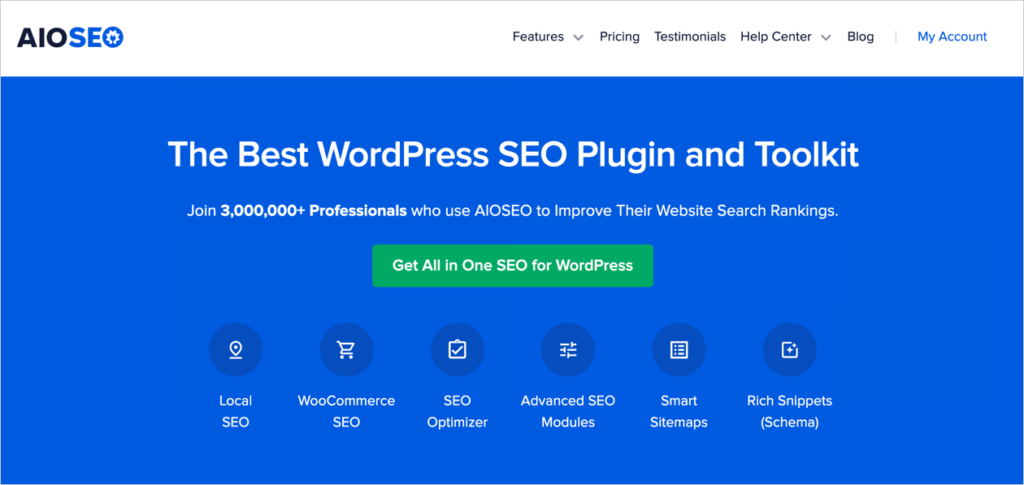
All in One SEO (AIOSEO) has thousands of 5-star ratings on WordPress.org. And it’s currently used by over 3 million sites.
As an added bonus, you’ll get access to AIOSEO’s world-class support team, staffed with experienced software engineers.
Step 1: Set Up Local SEO Basics
Once you’ve downloaded and installed the plugin, you’re ready to set up your local SEO basics.
In the WordPress admin bar go to AIOSEO » Local SEO.
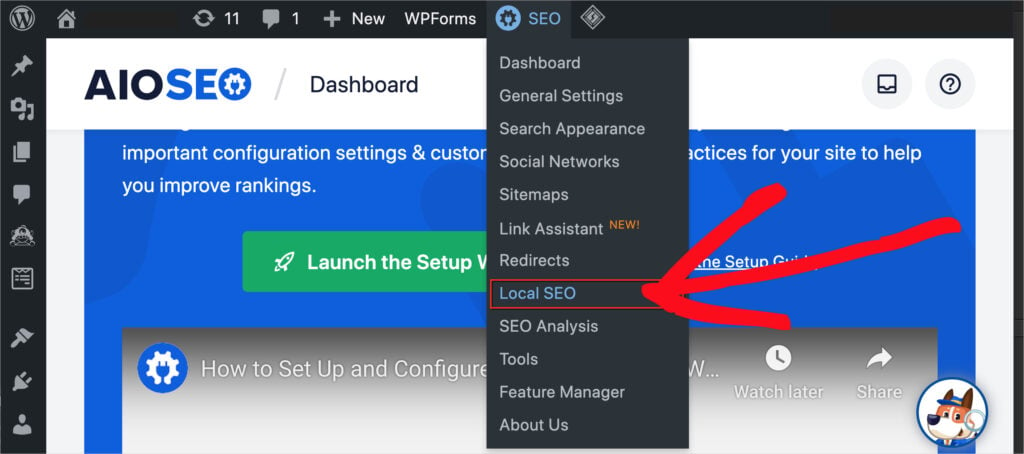
That will open a window with 3 tabs: for Locations, Opening Hours, and Maps.
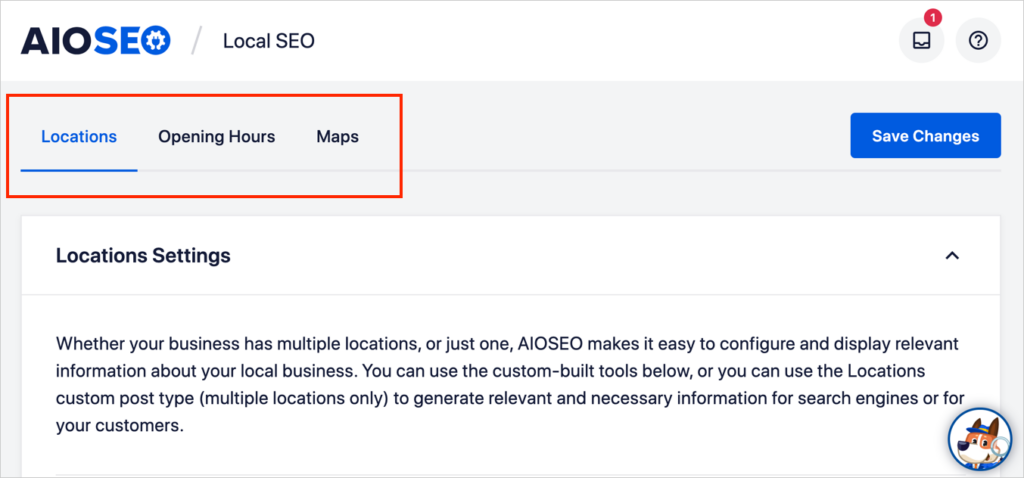
- Click on each tab.
- Then fill in the requested information.
This local SEO process adds code called schema markup to your website. The code helps Google understand your content better and match your business to relevant search queries.
Step 2: Check Your Homepage SEO
Next, review your homepage for improvements.
To do this, in the WordPress admin bar, navigate to AIOSEO » SEO Analysis.
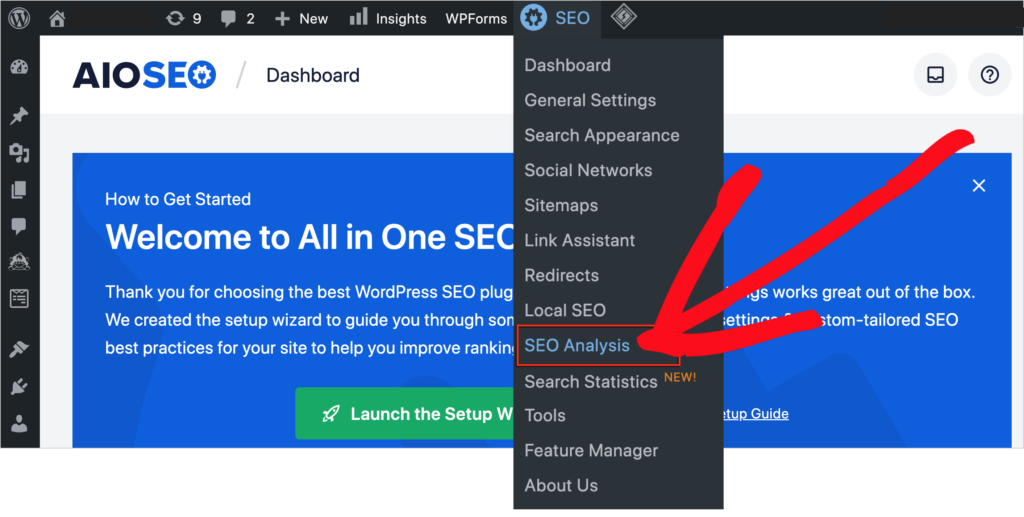
Now, you’ll see your website’s overall Site Score.
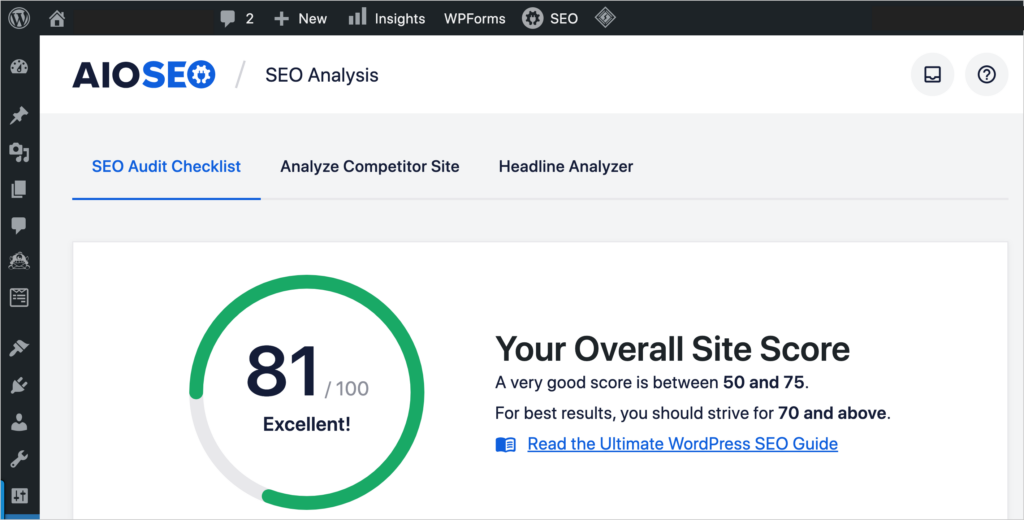
And beneath that is a Complete SEO Checklist.
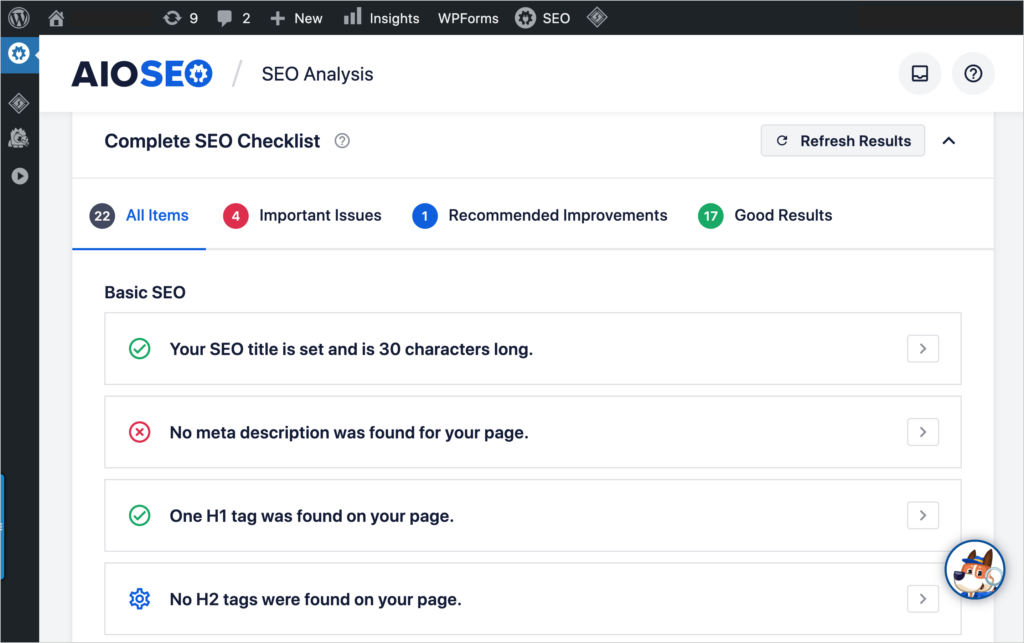
This checklist provides an analysis of your homepage with recommended action items. These are sorted by:
- Important Issues (flagged in red)
- Recommended Improvements
- Good results.
We recommend tackling Important Issues first.
Clicking on an item will provide the specific action steps to take.
For example, this checklist item tells us that our homepage is missing a meta description. And it provides a button to click that will take you to the area you need to add the description to.
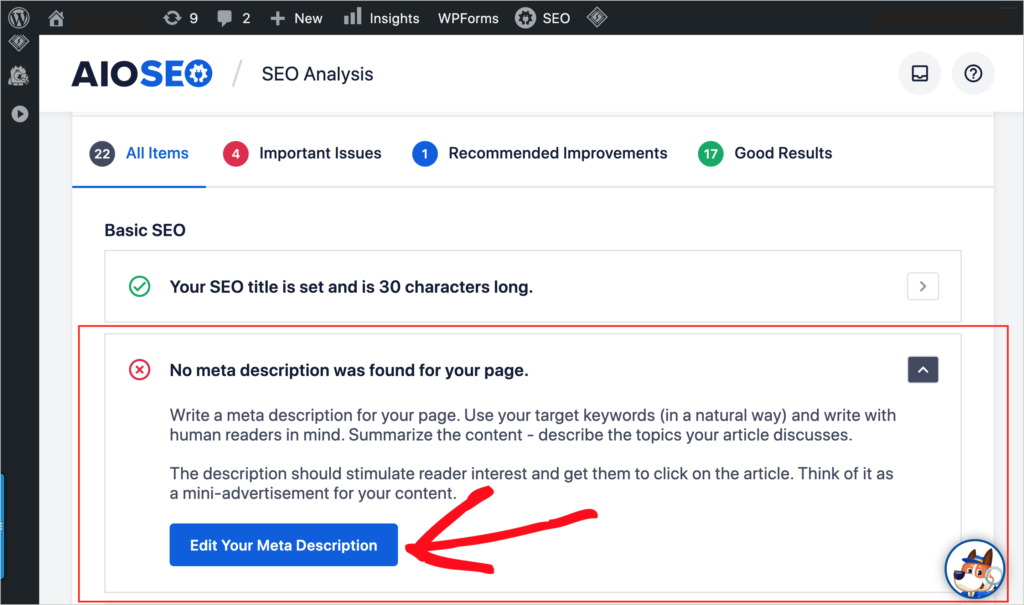
Step 3: Learn to Optimize Your Content
When you finish working through the items in your SEO Analysis report, we recommend learning how to optimize individual web pages for SEO.
You’ll be surprised at how easy it is to learn this. To get started, explore these options:
- Learn how to optimize titles and article descriptions
- Learn what a focus keyword is and how to use it.
- Learn what rich snippets are and how to create them.
And bookmark this blog to learn more.

Local SEO Guides and How-Tos
- How to Manage Google Reviews for Improved SEO (Small Business Guide)
- What is NAP in SEO? (Plus: Business Directory Listings Tips)
- How to Get Local SEO Citations and Business Directory Listings
- What are Google Local Services Ads for Small Business?
- What is the Google Guaranteed Badge for Local Businesses?
- How to Dominate Local Search
- Benefits of Local SEO
- How to Add Local Business Schema in WordPress
- Local Business SEO for a Single Location
- Local Business SEO for Multiple Locations
- Setting up Google Maps for Local SEO
- SEO for Beginners: A WordPress Guide
- Best SEO Tools for Small Business
What’s Next?
We hope this post helped you learn why having a Google Business Profile is important for your small business success and how you can make the most of it.
Also consider exploring Local Services Ads and how to get more traffic with FAQs.
If you found this article helpful, then please subscribe to our YouTube Channel. You’ll find many more helpful tutorials there. You can also follow us on Twitter, LinkedIn, or Facebook to stay in the loop.
Disclosure: Our content is reader-supported. This means if you click on some of our links, then we may earn a commission. We only recommend products that we believe will add value to our readers.
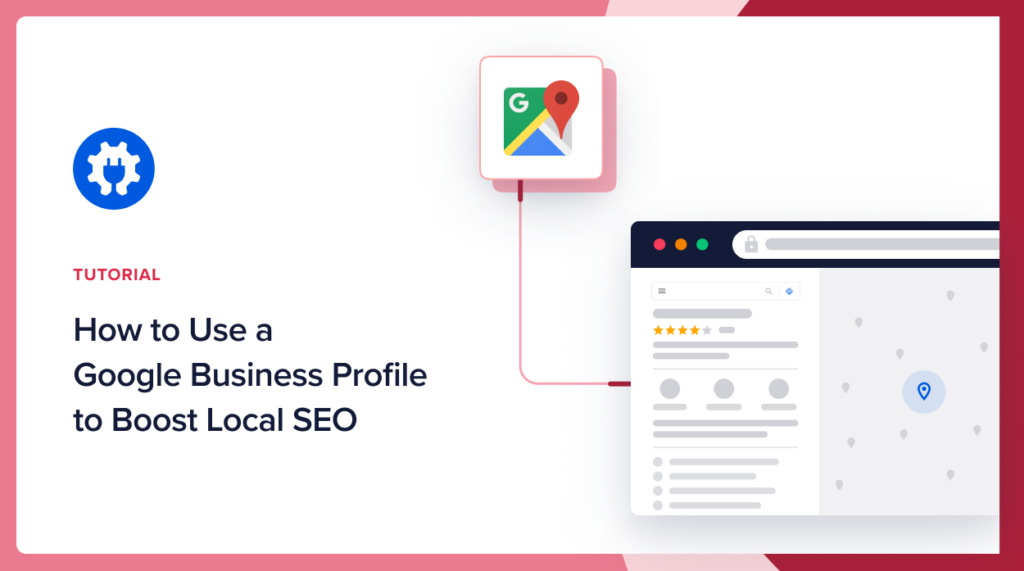

Thank you for sharing this informative article on how to use a Google Business Profile to boost local SEO. I appreciate the clear explanation of what a Google Business Profile is and how it can benefit small business owners. It’s great to know that creating a profile is easy to do and can potentially lead to increased conversions. The step-by-step instructions on how to set up and optimize a profile for SEO are also helpful. I do have a question about managing reviews for SEO. Can you provide more information on how to respond to negative reviews in a way that benefits SEO? Overall, this article has been very informative and I look forward to implementing these strategies for my small business.